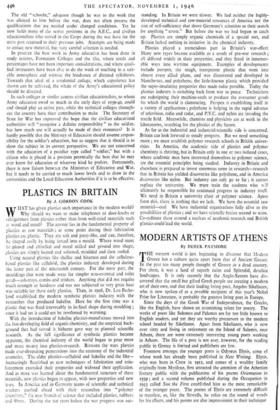PLASTICS IN BRITAIN
By J. GORDON COOK
WHAT has given plastics such importance in the modern world? Why should we want to make telephones or door-knobs or refrigerators from plastics rather than from well-tried materials such as wood and metal? The answer lies in the fundamental property of plastics as raw materials ; at some point during their fabrication plastics are plastic. They are soft and putty-like, and can, therefore, b. shaped easily by being forced into a mould. Where wood must he planed and chiselled and metal milled and ground into shape, plastics are simply heated and softened, moulded and then cooled.
Using natural plastics like shellac and bitumen and the cellulose- based plastics like celluloid, the plastics industry developed during the latter part of the nineteenth century. For the most part, the mouldings that were made were for simpler non-essential and toilet goodQ—ash-trays, combs and trinkets. Anything that d:d not require much strength or hardness and was not subjected to very great heat was suitable for these early plastics. Then, in 1908, Dr. Leo Baeke- land established the modern synthetic plastics industry with the researches that produced bakelite. Here for the first time was a plastic that was fixed irrevocably in its final shape during moulding ; once it had set it could not be resoftened by warming.
With the introduction of bakelite plastics-manufacture moved into the fast-developing field of organic chemistry, and the empirical back- ground that had served it hitherto gave way to planned scientific research. As the full significance of synthetic plastics became apparent, the chemical industry of the world began to pour more and more money into plastics-research. Between the wars plastics made ever-deepening penetrations into the economy of the industrial countries. The older plastics—celluloid and bakelite and the like— increasingly flourished as new techniques of fabrication and rein- forcement extended their properties and widened their application. And as more was learned about the fundamental structure of these materials, new plastics began to appear, with new properties and new uses. In America and in Germany teams of scientific and technical workers pushed ahead with their researches into " polymer chemistry," the new branch of science that included plastics, rubbers and fibres. During the ten years before the war progress was out- standing. In Britain we were slower. We had neither the highly- developed technical and raw-material resources of America nor the aim of self-sufficiency that drove Germany's scientists to their search for anything " ersatz." But before the war we had begun to catch up. Plastics are simply organic chemicals of a special sort, and Britain lacked nothing in initiative in the chemical industry.
Plastics played a tremendous part in Britain's war-effort. Many new types became available as a result of pre-war research ; all differed widely in their properties, and they fitted in innumer- able ways into wartime equipment. Examples of developments include perspex, the tough, transparent plastic that went into almost every allied plane, and was discovered and developed in Manchester, and polythene, the little-known plastic which provided the super-insulating properties that made radar possible. Today the plastics industry is switching back from war to peace. Technicians are redesigning their machine-tools to produce the consumer goods for which the world is clamouring. Perspex is establishing itself in a variety of applications ; polythene is helping in the rapid advance of television, radio and radar, and P.V.C. and nylon are invading the textile field. Meanwhile, chemists and physicists are at work in the laboratories, searching for the plastics of the future.
As far as the industrial and industrial-scientific side is concerned, Britain can look forward to steady progress. But we need something more ; we must establish polymer research schools in British univer- sities. In America, the academic side of plastics and polymer chemistry is thriving, but in Britain only in one or two isolated cases, where academic men have interested themselves in polymer science, are the essential principles being studied. Industry in Britain and elsewhere is prepared to invest enormous sums in research—research that in Britain has yielded discoveries like polythene, and in America discoveries like nylon. But industry can only go so far ; it cannot replace the university. We must train the students who will ultimately be responsible for continued progress in industry itself. We need in Britain a university chair of polymer science. Apart from this, there is nothing that we lack. We have the essential raw material—coal. We have industrial organisations fully alive to the possibilities of plastics ; and we have scientific brains second to none. Co-ordinate these around a nucleus of academic research and British plastics could lead the world.


































 Previous page
Previous page